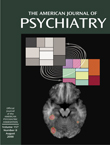Stressful Life Events and Depression
We read the article by Kenneth S. Kendler, M.D., et al. (1) with great interest. The authors addressed the important issue of the extent to which stressful life events cause the onset of depression and concluded that “about one-third of the association between stressful life events and onsets of depression is noncausal.” Using a database derived from the Virginia Twin Registry, the authors provided two basic results to support their conclusion: 1) dependent stressful life events (resulting from the subject’s behavior) are more strongly associated with depression than are independent events (unrelated to a subject’s behavior) and 2) the risk for depression associated with personal stressful life events appears to be higher in a sample of female twins than in a subsample of monozygotic twins. Although these findings appear to provide general support for the article’s conclusion, the methods used raise two concerns.
First, despite the value of using the co-twin control method for assessing genetic influences, it still appears necessary to provide some formal test of significance for the observed differences in risk among the general population, dizygotic twins, and monozygotic twins. In particular, if the difference between the reported estimated risk for depression associated with stressful life events in monozygotic twins (3.58) and the estimated risk for depression associated with stressful life events in the general population (5.64) is not statistically significant, then how can the ratio of 3.58 to 5.64 be a meaningful estimate of the degree of the causal relationship between stressful life events and depression?
Second, it appears that the technique used to assess dependent events might largely serve to relabel interpersonal events as dependent events because “for stressful life events involving interpersonal difficulties, interviewers were instructed to assume that the events were dependent unless convincing evidence to the contrary was presented.” If so, then the substantial risk that the authors associated with a rating of dependence might have reflected a substantially greater risk for depression associated with interpersonal events than with noninterpersonal events. If, on the other hand, a substantial proportion of the interpersonal events were rated as independent, then the authors could have tested explicitly for differences in risk between interpersonal independent events and interpersonal dependent events. Without presenting some evidence that the risk associated with dependent events was distinct from the risk associated with interpersonal events, it does not seem possible to infer that the association between life events and depression was partially noncausal because the dependence of events was substantial.
We agree that determining the extent to which stressful life events are causally related to depression is an important clinical and genetic question. However, before even a rough estimate regarding the degree to which events are noncausal can be made, it seems essential to have a presentation of statistical tests for differences in risk for depression associated with life events among the general population, dizygotic twins, and monozygotic twins. Similarly, a clarification concerning life events classified as dependent is also fundamental to the understanding of the importance of the reported findings.
1. Kendler KS, Karkowski LM, Prescott CA: Causal relationship between stressful life events and the onset of major depression. Am J Psychiatry 1999; 156:837–841Link, Google Scholar



